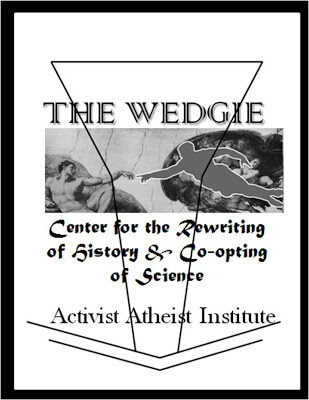Eugenie Scott is a physical anthropologist and director of the National Center for Science Education, an anti-theism organization dedicated to promoting and defending the teaching of atheism in public schools.
Eugenie Scott played the part of Svengali whilst being interviewed by Susan Milius in that she lays out the talking points that are meant to hide any question and any questioning as to the veracity of her particular concoction of atheism and evolution.1
Eugenie Scott urges scientists not to use the term “believe” when referring to their position on “evolution”-unfortunately, she does not define that she means by “evolution”,
You believe in God. You believe your sports team is going to win. But you don’t believe in cell division. You don’t believe in thermodynamics. Instead, you might say you “accept evolution.”
Actually, you also “accept God” and accept newspaper accounts that report that your sports team won the game. Moreover, cell division and thermodynamics has nothing to do with what most atheists mean by “evolution”-at least when they are in anti-theistic activist atheist mode.
Eugenie Scott affirms that how we use language to discuss new discoveries adds to the problem:
To put it mildly, it doesn’t help when evolutionary biologists say things like, “This completely revolutionizes our view of X.” Because hardly anything we come up with is going to completely revolutionize our view of the core ideas of science….An insight into the early ape-men of East and South Africa is not going to completely change our understanding of Neandertals, for example. So the statement is just wrong. Worse, it’s miseducating the public as to the soundness of our understanding of evolution.
You can say that this fossil or this new bit of data “sheds new light on this part of evolution.” [ellipses in original]
Note the unscientific self-assuredness and the all encompassing conception of “evolution” (whatever that is) nothing will ever completely revolutionizes atheism spiked Darwinian evolution although mere segments of it may have new light shed upon them. Note also that she correlates “our view of the core ideas of science” with her unstated definition of evolution yet, since she did not define her terms we do not know if she considers mere change in bio-organisms to be a core idea of science, or that God is superfluous at best, or abiogenesis, or part of the coelacanth family remained unchaged while another part became humans who go fishing, or ____________(fill in the blank). Later we will find out that she considers evolution to be common ancestry.

Also, it is likely true that “An insight into the early ape-men of East and South Africa is not going to completely change our understanding of Neandertals” since from the first to the current interpretation of the fossils of Neandertals they have been understood to be humans suffering from rickets.
Eugenie Scott also asserts that people get confused when scientists discover things and it is claimed that this causes ideas to change,
This is one of the real confusions about evolution. Creationists have done a splendid job of convincing the public that evolution is weak science because scientists are always changing their minds about things.
Well, since is she is one of many defenders of atheist co-opted evolution who refuses to debate creationists it seems as if she is content to take pop-shots from the peanut gallery.I would imagine that part of the issue is that, at least in this case, she is employing “evolution” to mean a catch-all theory so that no matter what has been discovered and will be discovered it can all be placed under the malleable term “evolution.” As Vox Day puts it,
_few can manage to keep up with adaptive devo punk-echthroi neo-quasi-Darwinism, or whatever the evolutionary biologists are calling this week’s spin on St. Darwin’s dangerous idea.2
Things that are Darwinian and things that are not are still subsumed under the term “theory of evolution” because quaint Victorian Era tall tales about it, somehow, fits.
As Philip S. Skell noted,
Natural selection makes humans self-centered and aggressive – except when it makes them altruistic and peaceable.Or natural selection produces virile men who eagerly spread their seed – except when it prefers men who are faithful protectors and providers.
When an explanation is so supple that it can explain any behavior, it is difficult to test it experimentally, much less use it as a catalyst for scientific discovery.3
Benjamin Wiker seconds that observation by noting the following in his consideration of “Game Theory”,
By using games with fewer rules than Candy Land, the Darwinian game theorists are claiming “to uncover the fundamental principles governing our decision-making mechanisms.” We’d better take a closer look, starting with their presuppositions_The answer seems to be that whatever has survived must be the most fit; therefore whatever exists must have been the result of natural selection. Fairness exists; therefore, it must be the result of natural selection. Q.E.D.
It is always convenient to have a theory that cannot possibly be proved wrong.4
If Eugenie Scott ever dared to debate creationists she would know that they, yes even the most fundi-bible thump’n-born againer-evang-YECers, have no problem “accepting” evolution so long as it is defined according to actual observations of changes and not defined according to philosophy or mere speculation.
In explaining what science is Eugenie Scott states:
_[We need to] help the public understand that the nature of scientific explanations is to change with new information or new theory – this is a strength of science – but that science is still reliable. And the core ideas of science do not change much, if at all.The core idea of evolution is common ancestry, and we’re not likely to change our minds about that. But we argue a lot about _ how the tree of life is branched and what mechanisms bring evolutionary change about. That’s the frontier area of science.
And then of course you have areas that claim to be science, like “creation science” and “intelligent design,” that are off in the fringe. Scientists don’t spend much time here because the ideas haven’t proven useful in understanding the natural world. [second ellipses in original]
Interestingly, on the last point; the above referenced Philip S. Skell-who is “the father of carbene chemistry,” member of the National Academy of Sciences and Emeritus Evan Pugh Professor at Pennsylvania State University-notes that the theory of evolution is irrelevant to the science of biology (and other fields).
In 1942, Nobel Laureate Ernst Chain wrote that his discovery of penicillin (with Howard Florey and Alexander Fleming) and the development of bacterial resistance to that antibiotic owed nothing to Darwin’s and Alfred Russel Wallace’s evolutionary theories.The same can be said about a variety of other 20th-century findings: the discovery of the structure of the double helix; the characterization of the ribosome; the mapping of genomes; research on medications and drug reactions; improvements in food production and sanitation; new surgeries; and other developments.
Additionally, I have queried biologists working in areas where one might have thought the Darwinian paradigm could guide research, such as the emergence of resistance to antibiotics and pesticides. Here, as elsewhere, I learned that evolutionary theory provides no guidance when it comes to choosing the experimental designs. Rather, after the breakthrough discoveries, it is brought in as a narrative gloss.5
Skell also warns students that if they have doubts about the ruling biological orthodox-Darwinism-they should keep their concerns to themselves for, the very real, fear of being blacklisted and risk their grades and careers (I demonstrated this with regards to Jonathan Wells).
Now we get a little bit of a window into her definition of “evolution” which is “common ancestry” and the “mechanisms” that may bring about the changes. Yet, common ancestry is the philosophical side of “evolution” and is inferred from interpretations of evidence. Just because genetic and anatomical similarities imply one designer is no reason to presuppose life coming about by pure chance and changing due to unguided blind selection aka: life or death.
As for Eugenie Scott’s view on the public understanding of evolutionary biology:
The public has a very poor understanding of evolution. People don’t recognize evolution as referring to the common ancestry of living things. Even those who accept evolution often don’t understand it well. They think it’s a great chain … of gradual increases in complexity of forms through time, which is certainly an impoverished view of evolutionary biology. That view is the source, in my opinion, of: “If man evolved from monkeys, then why are there still monkeys?” … That’s probably the second most common question I get on talk radio.
It’s like saying, “If you evolved from your cousins, why are your cousins still here?” And of course the answer is, well, in fact, I didn’t evolve from my cousins. My cousins and I shared common ancestors, in our grandparents. [ellipses in original]
It is amazing when you think about it: even though, at least in the USA, all public school children are indoctrinated into Darwinian evolution (spiked with atheism) in “science” class for a minimum of a dozen years apparently, many still do not understand it and many do not believe it-at least not in the evolution = God is superfluous sense (see stats here). Perhaps, Eugenie Scott should take a look at “science” textbooks and museum displays where little children are subjected to illustrations and sculptures of “ape-men.”
Eugenie Scott also elucidates her view on the current state of the effort to ensure that evolution is taught in schools,
Sometimes it feels like the Red Queen around here, where we’re running as hard as we can to stay in the same place. The thing is, creationism evolves. And for every victory we have, there’s pressure on the creationists to change their approach. We constantly have to shift our response. Ultimately the solution to this problem is not going to come from pouring more science on it.
Right then; it is those wacky creationists who are ruining all of that absolutely certain scientific evidence. This is interesting and one must guess what it means: is the evidence for her particular view of evolution so weak that she must turn to indoctrinating propaganda such as regulating the manner in which scientists speak? Or are those wacky creationists so good at what they do, to the point that personages such as Eugenie Scott will not debate them, that all of the convincing evidence is simply not enough to convince every public school child who is indoctrinated five days per week for at least a dozen years?
She admits that “the solution to this problem is not going to come from pouring more science on it” and so activist evolutionists have long, since before Darwin, been turning to propagandizing.
Recall the deny the evidence views of Richard Dawkins and Francis Crick:
Dawkins, “The Blind Watchmaker,” p. 1,
“Biology is the study of complicated things that give the appearance of having been designed for a purpose.”
Crick, “What Mad Pursuit,” p. 138,
“Biologists must constantly keep in mind that what they see was not designed, but rather evolved.”
Lastly, Eugenie Scott comments on what scientists and “people who care about science” should do,
I’m calling on scientists to be citizens. American education is decentralized. Which means it’s politicized. To make a change … you have to be a citizen who pays attention to local elections and votes [for] the right people. You can’t just sit back and expect that the magnificence of science will reveal itself and everybody will … accept the science.
Again, she calls for activism because indoctrination is not enough to convince many people of her particular view of “the science.”


